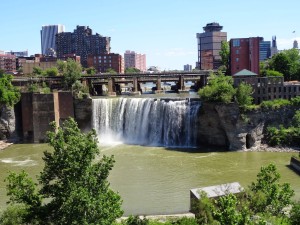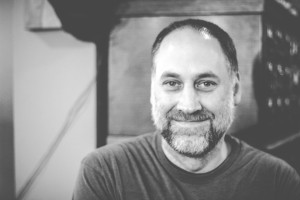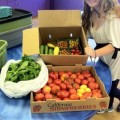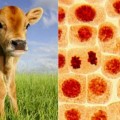 Rochester, New York, has a litany of shocking statistics. Rochester has the highest rate of extreme poverty in the U.S. for a similarly-sized city. The Rochester City School District’s student graduation rates for African American males (9%) and Latino males (10%) are routinely the lowest in the United States, while overall high school graduation rates are the worst in New York. According to recent studies, Rochester-born “babies are dying at a rate two times higher than the national average, and … mothers of color are three times more likely than white mothers to lose their babies before their first birthday.”
Rochester, New York, has a litany of shocking statistics. Rochester has the highest rate of extreme poverty in the U.S. for a similarly-sized city. The Rochester City School District’s student graduation rates for African American males (9%) and Latino males (10%) are routinely the lowest in the United States, while overall high school graduation rates are the worst in New York. According to recent studies, Rochester-born “babies are dying at a rate two times higher than the national average, and … mothers of color are three times more likely than white mothers to lose their babies before their first birthday.”
Things have to change. We imagine a different, brighter future through education.
I have been working with a number of people during the past two years to create a new urban K-12 school in Rochester called the Rochester River School. The founders of the Rochester River School think that our sustainable future needs generations of Solutionaries—young people who have been taught to solve problems in strategic, comprehensive ways that do the most good and least harm to people, other species, and the environment. The Rochester River School aims to create Solutionaries through a Humane Education curriculum (human rights, environmental stewardship, animal ethics, and cultural concerns). Our students will learn knowledge, skills, understandings, and dispositions to create changes, both large and small, and to replace injustice throughout the world with far-reaching justice.
One specific system the Rochester River School community will support is the waterways of Western New York. The Genesee River, Lake Ontario, Erie Canal, and the Finger Lakes, and the thousands of species that make these waterways their homes, are invaluable natural resources. Even young children can understand the injustice of possible extinction and the importance of conservation. One early project the Rochester River School students will tackle is to learn about and support the ongoing re-establishment of the New York State insect, the nine-spotted ladybug. Teaching students through relevant, real-world projects based on the intersection of science, mathematics, early literacy, art, and social sciences ensures joyous yet rigorous learning.
Through the Rochester River School’s Billion Bugs Project, which we plan to launch when the school opens in 2018, students will grow plants and rear and release one billion nine-spotted ladybugs (the New York State insect) on local organic farms. Such activities will enable even kindergarten students to engage in the following activities and subject areas: biology, art, field note taking and ecological journaling, community outreach and lobbying, math, and agriculture, to name a few. The Billion Bugs Project is not only about education but also about real world conservation projects that can actually help local and regional farmers with pest management, while reintroducing a species of lady beetle that was once thought to have been extirpated and is now endangered. The Rochester River School’s unique programs and curricula should help alleviate the Nature Deficit Disorder, help to create active “doers,” and prepare students for both college and career.
Another unique way the Rochester River School will develop Solutionaries is through a vegan school-nutrition program. We believe access to a plant-based diet, even just during school hours, will help children develop healthier bodies, stronger minds, and may even help them overcome the allergies and attentional issues that plague so many students. In addition, introducing children and their families to new foods early on may impact their food choices, and therefore their reliance on animals as food, for their lifetimes. The Rochester River School will be the first public school in the United States to provide completely vegan snacks, breakfasts, lunches, and curriculum.
We know that many City of Rochester children either go to school hungry or having eaten the wrong foods. We plan to feed our students healthy plant-based foods as part of the school’s vegan health and nutrition program. If we are successful, we expect to get our students growing food, preparing and cooking meals in our school’s kitchen, and eventually selling produce through the school’s urban farm and working CSA. We imagine that some of our students will take home the produce they have grown, share the knowledge that they have learned with their families and community, and create gardens.
We are supporting a vegan curriculum and nutrition program at the Rochester River School for several reasons. For starters, we think that a vegan diet is the most sustainable. According to every major environmental indicator (soil quality and erosion, water use and contamination, land use, waste, wildlife loss, species extinction, rainforest destruction/deforestation, ocean animal depletion and acidification, and greenhouse gas emissions, specifically methane and nitrous oxide [link: http://www.cowspiracy.com/facts/]), animal agriculture is not sustainable. People everywhere are beginning to realize that “happy meat/cows,” “sustainable beef/fishing,” and “humane slaughter” are myths. Indeed, there is no such thing as sustainable nor humane animal agriculture.
We also recognize that scientists, nutritionists, athletes, and even cardiologists are realizing that the growing literature and evidence points to a vegan diet as the best for human health. Perhaps most significantly, a vegan diet is the best diet for non-human animals. And then there is a large and growing social justice component as more people acknowledge that all oppression is linked. Intersectional social justice requires that we take a holistic approach toward ending oppression, suffering, and inequality throughout society. In our work, we are reminded of and inspired by many nineteenth-century first-wave feminists, African American and Latino leaders, and committed social justice activists who have followed vegetarian and vegan diets: Gandhi, Rosa Parks, Coretta Scott King, Dolores Huerta, Cesar Chavez, and Dick Gregory, as well as many athletes and celebrities.
We expect that our proposed school, its curricula, vegan nutrition program, and the athletic teams we will support such as rowing and cycling, will be differentiators for our urban, largely African American and Latino, student population. We expect to give each student a refillable water bottle, necessary gear, and bicycle when they enter the school.
The Rochester River Foundation, a 501(c)(3) nonprofit organization, is learning lessons about Solutionary education from New York City’s Harbor School, The Institute for Humane Education, Common Ground Charter School in Connecticut, and MUSE School CA, among others.
Please support our proposed school:
- LIKE and SHARE us with your friends on Facebook
- Complete our online COMMUNITY SURVEY (and encourage others to do the same)
- Reach out to other people to spread our message
- DONATE to the Rochester River Foundation
- ENDORSE, SUPPORT, or PARTNER with the Rochester River School
For more information, visit: www.rochesterriverschool.org and www.facebook.com/rochesterriverschool
Contact us: info@rochesterriverschool.org
About the author: Joel Helfrich is a father, historian, vegan, and cofounder of the Rochester River School and Rochester River Foundation, as well as the foundation’s vice-chair. If you ever visit Rochester, New York, please eat at The Red Fern, Vive, or Natural Oasis —all great vegan restaurants!







No Comments